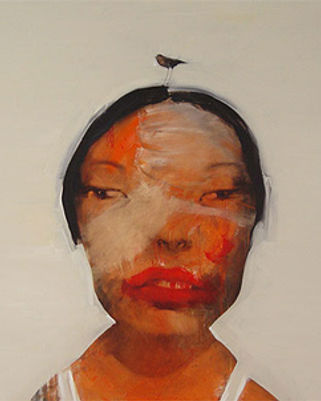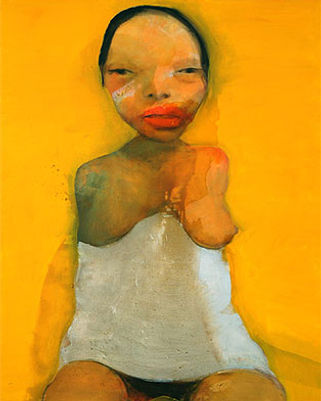Schuster Institute for Investigative Journalism
at Brandeis University
i n v e s t i g a t i o n s

Human Trafficking Stories
from Boston to Bangkok
Photo | 承燁 韓
Sex Trafficking from
Bangkok to Boston
Photo | 承燁 韓
WGBH Boston Public Radio
By Phillip Martin
Thursday, January 24, 2013
Special Report: Human Trafficking
"Underground Trade: From Boston to Bangkok" is a WGBH eight-part investigation by Schuster Institute Senior Fellow Phillip Martin into human trafficking, from East Asia to New York to New England.
Part 6: Trading in Shame
WGBH Investigations reports: Phillip Martin travels to Ho Chi Minh City, Vietnam, to the home of a man whose 19-year old daughter was just rescued from a brothel in China. It's a story too shameful to reveal, even to neighbors.
Listen to the broadcast, "Trading in Shame," at WGBH Boston Public Radio.
Additional Related Resources
Sexual Exploitation & Shame
In Vietnamese Culture
When WGBH Boston Public Radio’s investigative reporter Phillip Martin meets “Qui” and “Phong,” two Vietnamese teenage girls, they are laughing. You wouldn’t know they had just survived a year in which Martin says they “were kidnapped, severely beaten, raped and sold into slavery by organized human trafficking rings.” While their jovial behavior following such horrific experiences may seem inconsistent to Westerners, even puzzling, aspects of Vietnamese culture must be fully explored to help understand their attitudes.
The Filter Of Karma & Confucian Ethics
In many Asian cultures, the Buddhist and Hindu idea of karma influences how a person interprets and reacts to life experiences, good and bad—even to sexual exploitation or slavery.
Karma is defined by the Merriam-Webster Dictionary as “the force generated by a person's actions held in Hinduism and Buddhism to perpetuate transmigration and in its ethical consequences to determine the nature of the person's next existence.” In other words, karma can be understood as the connection to the circumstances in an individual’s present-day life to the actions and thoughts he or she took in previous lives. Because of the collectivistic nature of Asian cultures, karma also connects the individual to the actions and thoughts taken by family members and ancestors.
This notion of karma often helps some Buddhists try to understand why bad (and good) things happen, as described in the BBC’s Focus on Religions series. Accidents, illness, physical disability, losses of any kind or any wrongdoing against an individual can be seen as the consequences of previous transgressions. How the individual reacts in this life to difficult situations will largely determine the outcome of the next life.
Read about the Buddhist Law of Karma written by the Buddha Dharma Education Foundation.
Vietnamese culture and lifestyle are not only influenced by Buddhist belief in karma but also by Confucian ethics that exhort a person to guard the honor of the family. As a traditionally patriarchal society, women are taught and expected to defer to their husbands. And she must bear a son, for it is a son who carries a family’s lineage forward. A woman’s virginity honors a family and reflects positively on a man’s masculinity.
Read more about Confucianism in Vietnam and Confucian ethics.
Feminine Virtue
These are some of the cultural mores of the Vietnamese that influence their reaction to the horrors of human trafficking, and especially trafficking for sexual exploitation. Women’s shelter providers and health care service providers note that taboos and stigma associated with sexual activity and abuse act to silence those who have been victimized by traffickers and forced into sexual servitude. Vietnamese girls and women who have been sexually defiled, or even those who have engaged in pre-marital sex willingly, are not seen as “good” or virtuous and therefore bring shame to the family.
Read more about societies where the perceived loss of female virtue can result in what’s been called honor killings in this comprehensive report about violence against women across cultures.
Learn more about domestic violence against women in Vietnam.
Family & Human Trafficking
Migration and modern telecommunications and technology have helped loosen the family knot in Vietnam. Teenage girls like Qui, who was featured in Martin’s story, are especially vulnerable to exploitation. Attorney Van Ta of Blue Dragon Children’s Foundation told Martin that "time and time again" human traffickers, often older men, trick and deceive young girls into thinking they love them, and then sell them to prostitution rings.
But it’s not only men doing the trafficking. It’s not uncommon for girls to be sold into slavery by women too, even by family members, as the story of 25-year-old Linh illustrates. She was taken to China by an aunt who promised to take her shopping. Journalist Luke Dale-Harris writes about her ordeal:
“[Linh] was left with two Chinese ladies who took her to market and explained that she was to be sold as a wife. Over the next 5 months she would be sold at 6 different markets, being picked up by 'dealers' each time before being sold on. Finally she was bought and forced into marriage with a 30 year old man."
Learn more about bride trafficking in Vietnam in "The Plight of Vietnam's 'Mail Order' Brides."
In a country where family traditionally is so highly revered, it’s difficult to comprehend how family members can betray each other. Yet this is happening in Vietnam and many other countries, including the United States, where some parents have been charged with selling their own children, as these recent news reports explain.
-
Lincoln Man Accused in Child Prostitution Ring Changes Plea to 'Guilty'
-
Police: Man sold teen daughter into marriage for cash, beer, meat
Poverty is often attributed to the rising incidence of human trafficking in Vietnam, but Madam Thuy, Director of Human Trafficking department at the Centre for Women's Development in Vietnam, explains in an interview with Dale-Harris that "the disintegration of the family structure" is the most common factor "across all [trafficking] cases."
While Dale-Harris also points to conflicts between modernization, the adoption of Western ideals by the younger generation, and the conflict between the “divisive nature of incoming money” and traditional “filial loyalty" as other important factors contributing to the trafficking rate, he believes the “stories of the girls in shelters reinforce [Thuy’s] suggestion that the break-down of the family is at the root of the human trafficking problem in Vietnam. The vast majority of [girls in the shelters],” he writes, “were originally sold by either family members or close friends.”
While weakening allegiance to family and the lure of modern culture help explain some of the reasons why human trafficking occurs, traditional Buddhist and Confucius philosophies and ethics keep victims quiet about their ordeals.
Shame, The Great Enabler
Academics and healthcare service professionals attribute the notion of shame as the reason why Vietnamese victims of sex trafficking and human trafficking generally don’t speak up or seek help. In Martin’s story “Human Trafficking: Trading in Shame,” a father in Ho Chi Minh City, Vietnam is trying to sell his house to gather enough money to pay off his debt incurred to buy back his 19-year-old daughter’s freedom. Martin learned that she had been tricked by people she thought were her friends who took her to China and forced her into prostitution. Only a few people—Martin himself, two police officers in China, an anti-trafficking activist, the family, and one childhood friend—know the truth of the girl’s horrific story. And they won’t tell.
Victims of sex trafficking and their families often don’t talk about sexual exploitation because of feelings of shame. The rescued daughter tells Martin through a translator that she feels sorry for the shame she has brought upon her family. Martin says if word gets out, it is unlikely she will be able to marry, or even finish her education.
Shame keeps victims from testifying against their assailants. Says Martin, “If they did [testify], they’d be exposing their time [spent] in the sex trade, and in Vietnamese culture, how one became a prostitute is less important than the fact that you were or are a prostitute.”
Migrant Vietnamese face similar situations. Nam Pham, Executive Director of VietAID in Boston tells Martin “The most difficult thing for us to deal with is [the young women] are afraid of being arrested, they are afraid of bringing shame to their family, and they basically don’t trust anybody but a very small circle of people.”
“And even inside that small circle,” says Martin, “the families of victims hide the truth.” According to Martin, shame is what enables sex traffickers to keep doing what they are doing, in Southeast Asia, and here in the United States.
More Related Resources:
General resources:
Everyday Life in Southeast Asia, Kathleen M. Adams, Kathleen A. Gillogly, Indiana University Press
Buddhism in Vietnam, The Religions of Vietnam, The Navy Department Library
Vietnamese Buddhism in Intercultural Communication: the Aspect of Buddhist Philosophy, Hoang Thi Tho, Institute of Philosophy, Vietnam Academy of Social Sciences
Factsheet: The Vietnamese Population in the United States
Resources for healthcare and shelter service providers:
Socio-Cultural Influences on the Reproductive Health of Migrant Women
Guidelines for the Assessment and Treatment of Asian Clients
An Introduction to Vietnamese Culture For Rehabilitation Service Providers in the U.S.
Cultural Models of Shame & Guilt

"Qui" and "Phong" with Blue Dragon Children's Foundation's Van Ta. Photo | Phillip Martin
Part 1 : Hiding in Plain Sight
2 : The Route Through Queens
3 : The Business of Trafficking
6 : Trading in Shame
7 : Modern-Day Slavery in America
8 : Human Trafficking: What Now?
Special Report: Human Trafficking Underground Trade: From Boston to Bangkok is an eight-part investigation into human trafficking from East Asia to the Northeast Corridor of the United States by Phillip Martin, senior investigative reporter at WGBH Boston Public Radio and a senior fellow at the Schuster Institute for Investigative Journalism at Brandeis University.
The WGBH investigation was done in collaboration with the International Center for Journalists, the Ford Foundation, and the Schuster Institute for Investigative Journalism.
Claire Pavlik Purgus, Schuster Institute managing editor, conceptualized, designed and edited this site which provides supporting documentation and context for WGBH Radio's human trafficking investigation, "Underground Trade: From Boston to Bangkok" and
PBS American Experience's
"The Abolitionists."
Sophie Elsner, Schuster Institute research editor, supervised research by Brandeis students who work as Research Assistants at the Schuster Institute.
Students who contributed research:
Sidra Ahmed
David Altman
Damiana Andonova
Simon Cramer
Lydia Emmanouilidou
Dafna Fine
Ariel Glickman
Shafaq Hasan
Elly Kalfus
Lindi Li
Alisa Partlan
Avi Snyder
Andrew Wingens
Madeline Ziff
More Schuster Institute
Resources


Above, two 2008 paintings by modern Vietnamese artist
Do Hoang Tuong: "Young Woman" (top) and "The Girl."
Tuong's works are noted for the brutal emotion and twisted realism he portrays in his figures, and have been said to reflect the "pain and conflict of an era scarred by war, suppression... and radical cultural and social changes."


